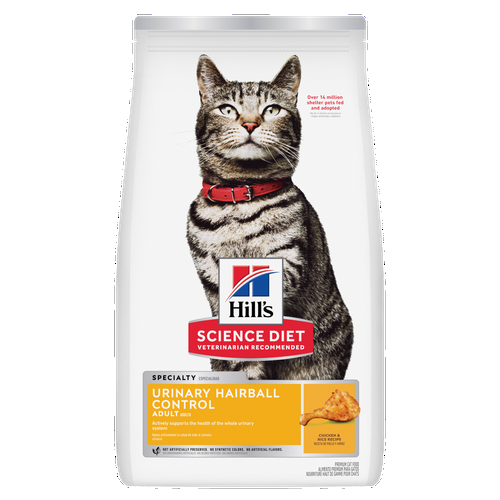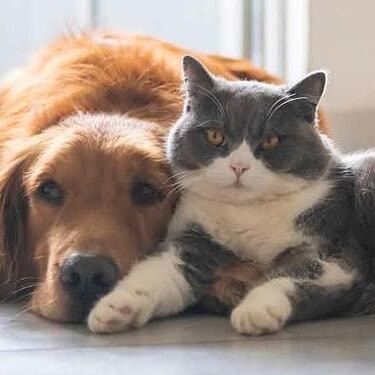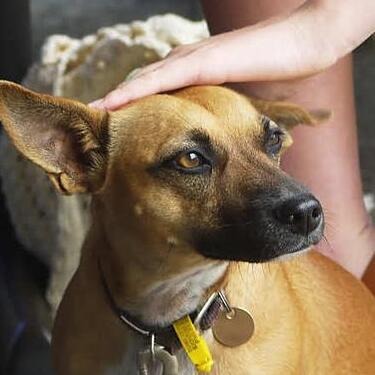

Your cat's weight is more than just a number. Overweight cats are at higher risk for health issues, including diabetes, osteoarthritis, heart disease, kidney disease, respiratory disease and, consequentially, decreased overall quality of life and life expectancy. For these reasons, weight control food for cats is an important tool for veterinarians and pet parents like you to help cats achieve and maintain a healthy weight.
Is Your Cat an Ideal Weight?
All cats have an ideal weight based on their breed and size, but sometimes it can be hard to tell how your cat stacks up with all that fur. If your cat is overweight, you may notice certain signs at home, such as decreased activity and trouble walking. If it's difficult to feel their ribs when applying gentle pressure, you can't clearly identify their waist or you notice their collar or harness fits tighter than it used to, your cat may be over their ideal weight.
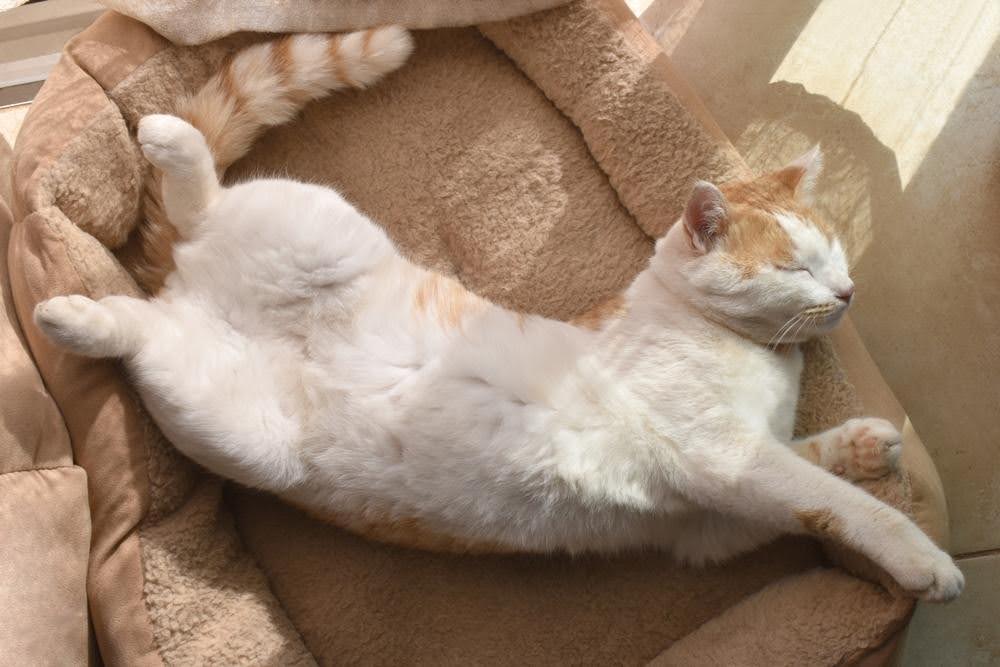
Your veterinarian will examine your cat using the body condition score (BCS) system, which grades body condition on a 9- or 5-point scale. The ideal BCS is 5 or 3.5 respectively. Anything above this is considered overweight. If your vet determines your cat needs to shed a few pounds or can't afford to put on more, they may recommend various strategies, including weight control food for cats, to support their health and wellness.
How Does Weight Management Cat Food Work?
Also known as weight management foods, weight control foods are designed to help your cat achieve or maintain a healthy weight in combination with a careful feeding plan. If you can provide your vet with the necessary information (the type and quantity of food you feed your cat), they may start by calculating how many calories your cat currently eats per day. Then, they'll adjust this value or provide a new value for weight loss or maintenance depending on your cat's ideal weight.
Weight management foods are available over the counter or through veterinary recommendation. Your vet can help you choose which food is most appropriate for your cat based on your pet's individual factors.
What's the Best Food for an Overweight Cat?
The most common weight control foods are low in calories. Low-calorie foods have decreased caloric density, which allows you to feed your cat fewer calories with the same (or larger) volume. Low-calorie foods are usually the most effective for weight loss.
Key Features of Weight Control Food for Cats
Weight control cat foods often contain:
Increased water or fiber content to support satiety while decreasing total calories.
An appropriate protein concentration to help maintain lean muscle.
A complete and balanced amount of all essential nutrients to prevent nutrient deficiencies while restricting calories.
A blend of soluble and insoluble fiber to support healthy digestion.
Some foods may also contain added nutrients to aid in weight loss or maintenance and promote wellness, such as:
Antioxidants to support healthy immune system function.
L-carnitine to help burn fat while increasing lean muscle.
Lysine to help break down fat for energy while sparing lean muscle.
There's no single best food for every cat. Your cat is as unique as their paw print, and their food should comprehensively address their needs, including any other health concerns. Discuss the options with your vet. Together, you can decide what food works best for your cat to obtain or maintain a healthy weight while supporting their overall wellness.
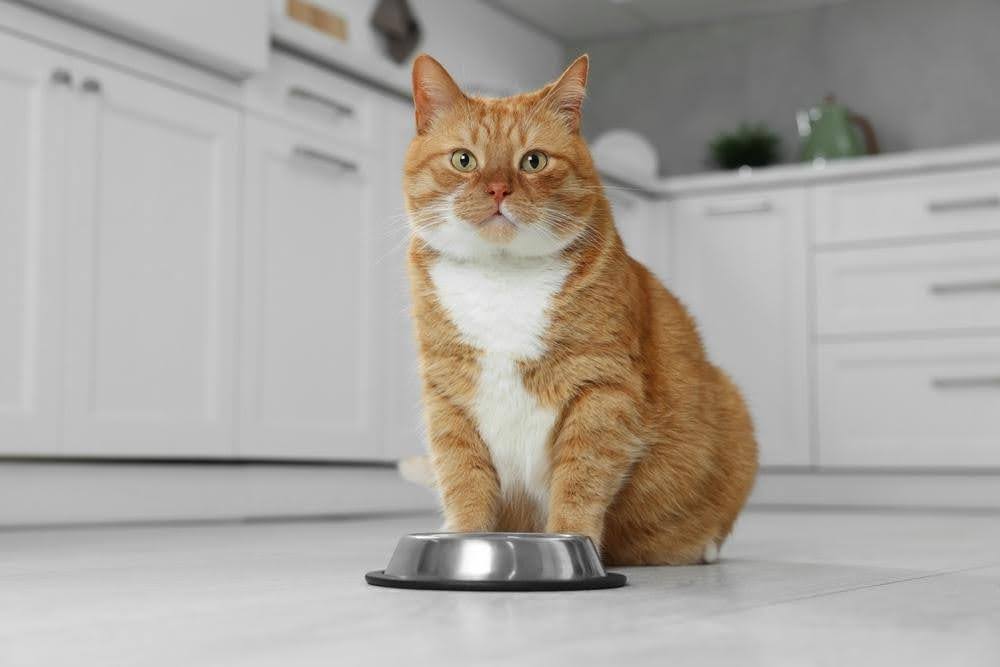
Feeding Tips to Promote Success
When switching your cat to a new food, the general rule is to slowly transition to it over a week or more to reduce the risk of gastrointestinal upset. However, as with any general guideline, some cats may need longer to adjust. If you know your cat is a picky eater or they aren't accepting their new food after following this schedule, your vet can help you adjust as needed. Don't give up if they don't take to the new food right away — patience is key when it comes to changing a cat's food.
To help your cat reach or maintain their goal weight, ensure proper portions. Weighing food on a gram scale is the most accurate measuring method to ensure you're feeding your cat the appropriate amount. Aim for at least two meals per day, and keep a consistent schedule. Automatic feeders can establish regularly timed meals. In multi-cat households, microchip-sensing cat feeders — which only open for a specific cat — can ensure each cat receives the appropriate nutrition for their needs.
Finally, limit treats, and opt for low-calorie options. You can also subtract a small portion of your cat's normal food from their daily amount and offer it as treats instead. Foraging balls, food puzzles and other enrichment feeders can help stimulate your cat mentally while encouraging activity.
How to Keep Your Cat at a Healthy Weight
Activity supports weight loss and continued weight management once your cat achieves a healthy weight. Engage them in laser pointer or flashlight play, offer a variety of toys and provide cat trees or other climbing structures. If your cat follows you everywhere you go, simply walking around the house can be part of your cat's weight management plan.
Weight control food for cats is a great tool for both losing weight and maintaining a healthy weight. As with any species, it's easier to maintain a healthy weight than to shed excess pounds, so be proactive. A combination of the appropriate food, exercise and veterinary care — including regular wellness checkups and body condition score monitoring — can help keep your cat in tip-top shape and promote lifelong health.






